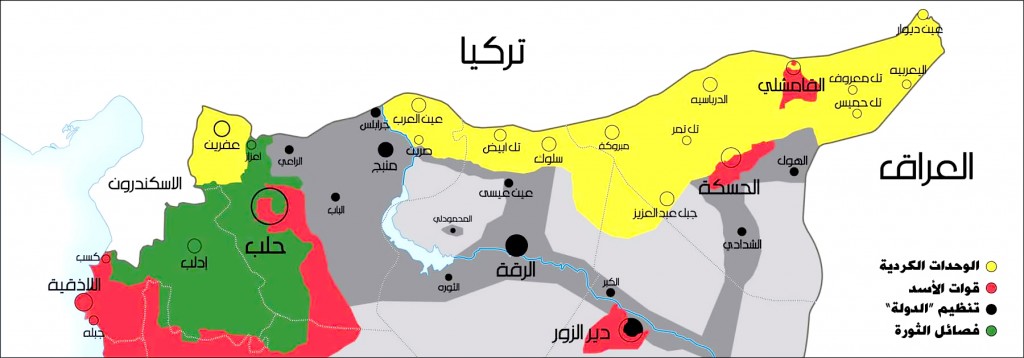Democratic Union Party, PYD, monopolizes power and controls the majority populated Kurdish regions in Syria. Starting in the summer of 2012, each city liberated from regime forces, came under the rule of the PYD party. It established an administrative court in each city and imposed power on all cities of Hasaka Governorate, Tell Abyad and Ayn al-Arab.
The judicial responsibility is not that of the judge alone in the Kurdish autonomous administered regions. The solution to any problem starts from Dar al-Shaab. Concerning problems related to women, Dar al-Maraa is the responsible for solving the problems. The staff in these houses try to solve problems through reconciliations but if the problem is not solved, the case is transferred to the courts.
How does Kurdish Peoples’ Courts Function?
There are 9 courts in the autonomously administrated regions as well as 4 courts of appeal, and a court of cassation in the city of Qamishli.
Verdicts related to money cases vary between peremptory judgments and inconclusive judgments. The verdicts vary depending on the sum of money. However, when it comes to legal and penal lawsuits, the verdicts are all conclusive.
Verdicts in relation to felonies are conclusive and they are issued in special courts which the autonomous administrated runs alone. It is known as a ‘platform’. The ‘platform’ is a larger model than normal courts. These are composed of various members of society; they aim to be inclusive of all society. Felonies lawsuits take place in these courts because the administration considers these to be lawsuits that concern the public opinion; therefore, in these cases, the defence, the prosecution, some courts member, members of local NGOs, and civil audience participate in these cases. The trial aims at criminal libel so the defendant is punished through the use of slander in front of the people. In addition to that, larger sections of society participate in the verdict which is inconclusive.
Social Justice is the Reference for Peoples’ Courts
Legal Council in the Autonomously Administrated regions enforces (Syrian state) law related to civil issues. For instance, domestic household laws follow special laws in the Democratic People Party, for instance the party prohibits polygamy. In instances when there is a gap in the Party laws, Syrian state law fills in.
There is no certain law followed in instances of felony and the party considers those a matter of public opinion. Hence, social justice is enforced by translating people’s and judges’ opinions into court verdicts. These cases take place in Platform Courts.
Critics of Peoples’ Courts Function
Peoples’ Courts enforcement of the concept of social justice has drawn a lot of criticism from legalists and jurists. They indicated to Enab Baladi that, ‘what these courts are doing is a catastrophe in the right of the law because there is no enforced law. The only credited form of law in their cases is the social justice standard. The conscious of the judge, the people, and their perspectives is all that matters. There are neither texts nor provisions. These courts use some texts from the Syrian law in some cases and it is only limited to appealling procedures.’
‘Regardless of the mistakes of the Sharia Boards, they still appoint judges disciplined by Sharia regulations even if these judges were not specialists in the field. In contrast, the only qualification of a judge in People’s Courts is the military personnel choosing him/her regardless of scientific qualification of his/her main profession,’ they added.
Furthermore, critics pointed out that the courts under regime control and which are still functioning in most areas under autonomous administrations. According to critics, this would lead to a confusion and double standards in reference and contradictive verdicts/provisions. In addition to that, state institutions which the regime controls do not accept neither provisions nor documents issued by Peoples’ Courts.
A legalist, who did not want his name mentioned, told Enab Baladi that, ‘mistakes done by Peoples’ Courts are bigger than the mistakes done by Sharia Boards. However, media focuses only on the Sharia Boards to show their mistakes and crimes, whereas wrongdoings by Peoples’ Courts are overlooked.’
Prominent Judges Assassinated in Liberated Areas
Many prominent judges and lawyers described as qualified and professional were threatened because of their work across liberated areas. Some of them were assassinated in the most heinous ways. The perpetrators remain unknown. Some assassination cases are still under investigations.
continue all topic:
Prominent Judicial Bodies Formed in Liberated Syria
The Phase of Regression: ‘Sheikhs’ Replacing Judges
Peoples’ Courts in Autonomous Administrated Regions
Free Independent Syrian Judiciary Council
Three Authority References Warn of the Division of Syria
Syrian State Law: will its continued implementation help maintain the unity of Syrian territory?
Islamic Sharia: Military Brigades Reject Legal References and Insist on the Implementation of Sharia
Judicial Schemes and the Shape of Laws in Areas outside the control of the Syrian Regime
Judiciary in Aleppo is unable to counter the Hegemony of the Military
Rehabilitative Program for Prisoners in Aleppo
Deraa: The Judiciary Scheme, Shape of laws in it since its Liberation
Eastern Ghouta: Foundation of Independent Judiciary following Liberation
Judiciary is absent from Western Ghouta and Sharia Implementation in Qalamoon
Jaysh al-Fateh Promises to implement a Unified Judicial Reference in Idlib
Al-Nusra Front Controls Judiciary in Lattakia Countryside
Hama Countryside: Absence of Judiciary and Subordination of Khan Sheyhun court
Al-Waer court and resolving dispute by consensus in Homs
Judiciary in Deir ez-Zor terminated by ISIS
Attempts at founding Judiciary in Raqqa were terminated by ISIS
Judiciary System under Baath Rule
How do Syrians value courts’ performance and Judiciary in their liberated areas?
Killing Justice in the North of Syria
Higher Judiciary Institute in Aleppo: First Graduates in Liberated Areas
